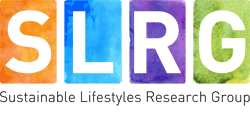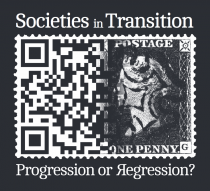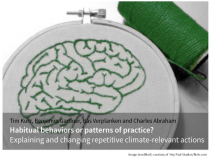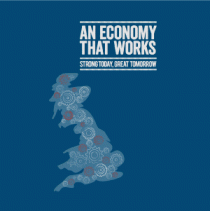- About
- Team
- Projects
- Children and the Environment
- ELiCiT (Exploring lifestyle changes in transition)
- Foundations for Sustainable Living
- HABITs
- Mapping Rebound Effects
- PASSAGE (Prosperity and Sustainability in the Green Economy)
- Policy Dialogue
- Price Responsiveness of Demand in Energy
- Resilience and Sustainable Lifestyles
- Sustainability Transitions in Food Systems
- Sustainable Living in Remote Rural Scotland
- Publications
- News
- Events
Publications
. Habitual behaviors or patterns of practice? Explaining and changing repetitive climate-relevant actions. WIREs Climate Change. 2015;6:113–128.
. Civil society roles in transition: towards sustainable food?. 2014;02 - 14.
. New Motherhood: A moment of change in everyday shopping practices?. Young Consumers. 2014;15(3):211 - 226.
. Who rebounds most? Estimating direct and indirect rebound effects for different UK socioeconomic groups. Ecological Economics. 2014;Volume 106:12–32.
. Commercial local area resource and emissions modelling – navigating towards new perspectives and applications. Journal of Cleaner Production . 2013;42 (2013) :241-253.
. Constructing grassroots innovation. Global Environmental Change . 2013;23(5):827-829.
. Grassroots innovation movements: challenges and contributions. Journal of Cleaner Production . 2013;63:114-124.
. People or places? Factors associated with the presence of domestic energy efficiency measures in England. 2013;01-13.
. Sustainable consumption and lifestyles? Children and youth in cities . In: World Social Science Report. World Social Science Report. OECD Publishing and Unesco Publishing; 2013:357-364. doi:10.1787/9789264203419-60-en.
. Sustaining trajectories towards sustainability: dynamics and diversity in UK communal growing activities. Global Environmental Change. 2013;23(5):838–846.
. Turning lights into flights: Estimating direct and indirect rebound effects for UK households. Energy Policy. 2013:234–250.
. Understanding transition-periphery dynamics: renewable energy in the Highlands and Islands of Scotland . Environment and Planning. 2013;45(3):691-709.
. Well-being and Sustainable Development. In: Oxford Handbook of Happiness. [Editors: S David. I Boniwell and A Conley]. Oxford Handbook of Happiness.; 2013:498-517.
. The Cinderella economy: an answer to unsustainable growth?. 2012;(27 July 2012).
. A commentary on the UNEP green economy scenarios. Ecological Economics . 2012;77:11-15.
. Forecasting UK household expenditure and associated GHG emissions: outlook to 2030. RESOLVE Working Paper Series . 2012;02-12. resolve_wp_02-12.pdf (530.06 KB)
. Forecasting UK household expenditure and associated GHG emissions: outlook to 2030. Ecological Economics. 2012; 84 :129–141.
. Let's be less productive. The New York Times. http://www.nytimes.com/2012/05/27/opinion/sunday/lets-be-less-productive.html. Published 2012.
. Prospérité sans croissance: comment faire? . Constructif. 2012;31(01/2012).
. Prosperity without growth. In: Growth in transition. [Editors: F Hinterberger, E Freytag, E Pirgmaier and M Schuster]. Growth in transition. Abington/New York: Earthscan/Routledge; 2012:62-65.
. Time, gender and carbon: A study of the carbon implications of British adults' use of time. Ecological Economics . 2012;84.
. Unravelling the Threads: Discourses of Sustainability and Consumption in an Online Forum. Environmental Communication . 2012; 6/01:101-118.
. Wachstum rettet uns nicht. Der Tagesspiegel. Published 2012.
. Confronting consumption: challenges for economics and for policy. In: The Political Economy of the Environment: an Interdisciplinary approach. [Editors: S Dietz, J Michie and C Oughton]. The Political Economy of the Environment: an Interdisciplinary approach. Abingdon/New York: Routledge/Earthscan; 2011:189-212.
. Die Droge Wachstum. KULTURAUSTAUSCH - Zeitchrift für internationale Beziehungen. 2011;I/2011.
. Has western capitalism failed?. 2011. Available at: http://www.bbc.co.uk/news/business-14972015.
. Missing carbon reductions? Exploring rebound and backfire effects in UK households. Energy Policy . 2011;39:3572-3581.
. Multicritria Diversity Analysis: theory, method and an illustrative application. In: Handbook on Sustainable Use of Energy. Handbook on Sustainable Use of Energy. Edward Elgar; 2011.
. Pluralising Progress: from integrative transitions to transformative diversity. Journal of Environmental Innovation & Societal Transitions. 2011;1:82-88.
. Productivity and Work in the New Economy – Some Theoretical Reflections and Empirical Tests. Environmental Innovation and Societal Transitions. 2011;01/01:101-108. doi:http://dx.doi.org/10.1016/j.eist.2011.04.005.
. Societal transformations for a sustainable economy. Natural Resources Forum. 2011; 35:155-164.
. UK Youth: The conflicts of contemporary lifestyles. United Nations Environment Programme; 2011.
. Dynamic Sustainabilities: Technology, Environment, Social Justice. London: Earthscan; 2010.
. The Effects of Power in Framing the Dynamics of Security: from risk and stability to precaution and robustness. In: Critical Perspectives on Security, University of Maastricht, 27th-28th May 2010. Critical Perspectives on Security, University of Maastricht, 27th-28th May 2010.; 2010.
. Mapping rebound effects from sustainable behaviours: Key Concepts and Literature Review. 2010;01-10.
. Multicriteria Diversity Analysis: a novel heuristic framework for appraising energy portfolios. Energy Policy. 2010;38:1622-1634.














